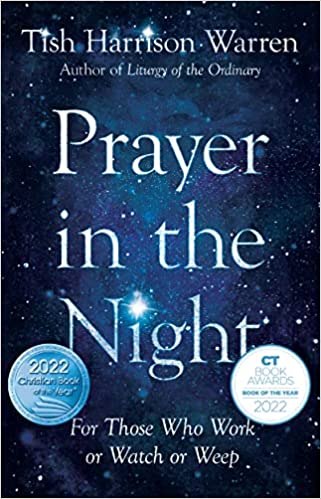Tonight we are discussing Chapter 8 “Give Rest to the Weary: Weakness and Silence” of the Rev. Tish Harrison Warren’s book Prayer in the Night: For Those Who Work or Watch or Weep. In reading through this chapter, please find a quiet space and a quiet time to allow for self-reflection.
The Prayer:
Keep watch, dear Lord, with those who work, or watch, or
weep this night, and give your angels charge over those who
sleep. Tend the sick, Lord Christ; give rest to the weary, bless
the dying, soothe the suffering, pity the afflicted, shield the
joyous; and all for your love’s sake. Amen.
1979 BCP 134
Exhaustion:
Rev. Warren concludes here meditation on “give rest to the weary” with the observation that “spiritual discipline requires energy, and exhaustion turns resolution into dissipation.” p.109. In her Prologue, she writes that she began to pray Compline when she could not find the words to pray for herself. She reached a point where she was so weary that she could only pray the liturgical prayers of the Church. But, as she tells us in this chapter, there are times that even liturgical prayer fails when there is simply nothing left for us to say even if we are given the script.
Silence:
When all words fail, there is only silence. We become like Elijah standing at the entrance to the cave. 1 Kings 19:12. Silence is the final stage in our recognition that we must let go of ourselves and our ego and let God act. Silence “reminds us that there is a limit to the power of words and to human reason.” p.111. Silence reminds us that we can never be in charge. A good discussion of silence in prayer is in our previous study of Albert Rossi’s book Becoming a Healing Presence, particularly in the opening chapter. (attached).
As Rev. Warren reminds us, silence in prayer goes back to the ancient Christian tradition of apophatic theology. The apophatic tradition is based on the assumption that God’s essence is unknowable or ineffable and on the recognition of the inadequacy of human language or knowledge to describe God. We have previously looked at this type of theological outlook in our discussion of Genesis 1:1a.
Silence and apophatic theology allow us to fully enter into the mystery of God. In silence, we come to rest in the ineffable presence of God and come to be patient with God’s own silence. It is in our silence, at the point of exhaustion, that our questions simply melt away, and true rest is found.
Questions and Practices:
Rev. Warren’s suggested questions and practices for chapter 8 are:
1. Where have you seen “curated weakness” on display in our culture, in the church, or in your own life? How does this differ from true vulnerability?
2. How have you found rest when you have been weary? What practices or experiences have brought renewal?
Dinner is at 6. The menu is clam chowder with spinach salad. Discussion about 6:45. Compline at 8.
For thus said the Lord God, the Holy One of Israel:
Isaiah 30:15
In returning and rest you shall be saved;
in quietness and in trust shall be your strength.

